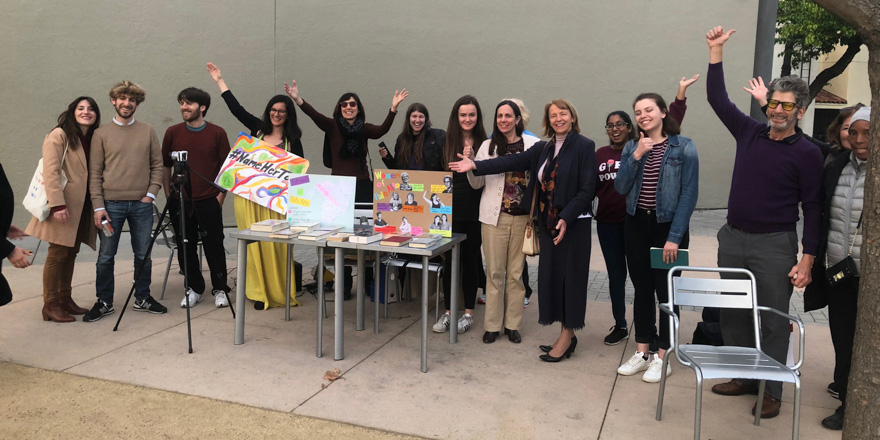Thursday evening, protesters gathered at Lytton Plaza in downtown Palo Alto to advocate for its renaming as part of the “#NameHerToo” campaign and in coordination with International Women’s Day. The campaign is a response to the fact that while 27 streets in Palo Alto are named after male writers, none are named for female writers, according to the event’s co-organizer Patricia Martín Rivas.
Rivas said she was inspired by a similar campaign that she led in Madrid last January in the “Barrio de las Letras” (Neighborhood of Letters), which had quotes by only male authors inscribed on its pavement. When she came to visit Palo Alto, she said she noticed a similar trend with the city’s street names.
Chloe Stoddard ’21, co-organizer of the Stanford Women’s March and attendee at Thursday’s gathering, said Lytton Plaza’s historic significance as a place of protest made it a strong candidate for renaming.
“The plaza is also a prominent location where multiple streets converge, so it’s hard to miss. Naming it after a woman would help make a powerful statement,” Rivas added.
During the event, residents came forward to nominate candidates to rename the plaza after. Nominees included Barbara Babcock, Stanford Law School’s first female faculty member, and Anna Zcshokke, the first resident of Palo Alto, commonly dubbed the “Mother of Palo Alto Schools.”
Protesters gathered at the plaza chanted, “Name her too!” after each candidate’s name was read aloud by Rivas.
“I’m glad that this movement for more visibility of women is gaining attention — even amongst my middle school students, I notice such conversations,” said Caroline Lucas, a teacher at La Entrada Middle School in Menlo Park who attended the protest.
Lucas also expressed her disappointment that no schools in Palo Alto are named after Zschokke, despite her contribution to the establishment of the city’s first high school.
Stoddard added that renaming has been a topic of much debate at Stanford, where a number of campus landmarks are named after controversial historical figures. She referred specifically to current renaming efforts around campus locations named after 18th century missionary Junipero Serra, who is associated with the mistreatment of Native peoples.
“I feel that women, and especially women of color, ought to be honored and better represented on campus,” she said.
Stoddard nominated civil rights activist Dolores Huerta for the renaming of the Plaza.
After making cases for each nominee, protesters volunteered to read aloud excerpts from books by female authors, including Emily Dickinson and Jane Austen.
Moving forward, Rivas said she hopes that the movement gains more support so she can start an online petition for the renaming of the Plaza. She added that she is also considering drafting a formal proposal to be reviewed by the City Council.
Contact Surbhi Sachdeva at surbhi3 ‘at’ stanford.edu.
